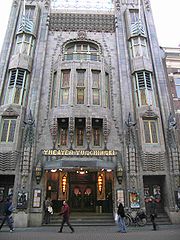
Abraham Icek Tuschinski
Encyclopedia

Polish language
Polish is a language of the Lechitic subgroup of West Slavic languages, used throughout Poland and by Polish minorities in other countries...
spelling: Tuszyński) (Brzeziny
Brzeziny
Brzeziny is a town in Poland, in Łódź Voivodeship, about 20 km east of Łódź. It is the capital of Brzeziny County. Population is 12,417 .- History :...
(near Łódź), May 14, 1886 – Auschwitz, September 17, 1942) was a Dutch businessman of Jewish-Polish
Poland
Poland , officially the Republic of Poland , is a country in Central Europe bordered by Germany to the west; the Czech Republic and Slovakia to the south; Ukraine, Belarus and Lithuania to the east; and the Baltic Sea and Kaliningrad Oblast, a Russian exclave, to the north...
descent who ordered the construction of the Tuschinski Theater, a famed cinema
Movie theater
A movie theater, cinema, movie house, picture theater, film theater is a venue, usually a building, for viewing motion pictures ....
in Amsterdam
Amsterdam
Amsterdam is the largest city and the capital of the Netherlands. The current position of Amsterdam as capital city of the Kingdom of the Netherlands is governed by the constitution of August 24, 1815 and its successors. Amsterdam has a population of 783,364 within city limits, an urban population...
.
While emigrating to the United States
United States
The United States of America is a federal constitutional republic comprising fifty states and a federal district...
in 1903 Tuschinski decided to remain in Rotterdam
Rotterdam
Rotterdam is the second-largest city in the Netherlands and one of the largest ports in the world. Starting as a dam on the Rotte river, Rotterdam has grown into a major international commercial centre...
. He found success as a movie theatre owner, opening his first four cinemas in 1911: the Thalia, Cinema Royal, Scala and Olympia. His most luxurious cinema in Rotterdam, the Grand Theater, opened in 1928.
His crowning achievement, the Tuschinski Theater, opened its doors in Amsterdam on October 28, 1921. The unique design of this building was a mix of three modern styles: Amsterdamse School, Art Deco
Art Deco
Art deco , or deco, is an eclectic artistic and design style that began in Paris in the 1920s and flourished internationally throughout the 1930s, into the World War II era. The style influenced all areas of design, including architecture and interior design, industrial design, fashion and...
and Jugendstil. The elaborate exterior and opulent, richly decorated interior were restored to their former glory in 1998-2002. Tuschinski also opened another famed Amsterdam cinema, the Roxy Theater, in 1928.
When World War II
World War II
World War II, or the Second World War , was a global conflict lasting from 1939 to 1945, involving most of the world's nations—including all of the great powers—eventually forming two opposing military alliances: the Allies and the Axis...
broke out, Tuschinski lost all his cinemas in Rotterdam when the city was bombed by the Germans on May 14, 1940 (see Rotterdam Blitz
Rotterdam Blitz
The Rotterdam Blitz refers to the aerial bombardment of Rotterdam by the German Air Force on 14 May 1940, during the German invasion of the Netherlands in World War II. The objective was to support the German troops fighting in the city, break Dutch resistance and force the Dutch to surrender...
). On July 1, 1942, he was transported to the Westerbork concentration camp in the northeast of the Netherlands, and from there to Auschwitz, where he was murdered.

